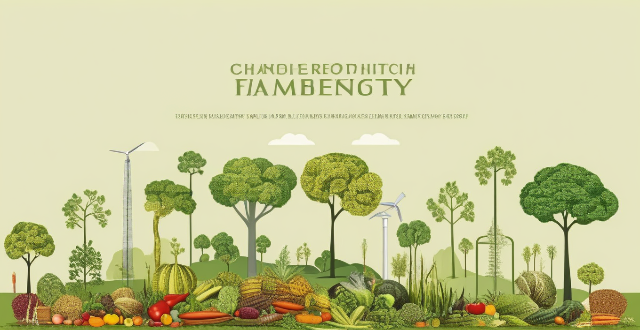Climate change is expected to impact global food production, trade, and market stability significantly. Reduced crop yields, unpredictable harvests, decreased livestock productivity, increased disease prevalence, shifting production zones, and increased competition for resources are some of the long-term implications. These changes can lead to price volatility, increased vulnerability to food insecurity, and economic challenges for farmers and consumers. Addressing these challenges requires a collaborative effort from governments, international organizations, and stakeholders across the food system to develop strategies that promote resilience and adaptive capacity in the face of climate change.

Long-Term Implications of Climate Change for Global Food Trade and Market Stability
Climate change is a complex phenomenon that has far-reaching consequences for various aspects of life on Earth, including the global food trade and market stability. The following are some of the long-term implications of climate change in this context:
Introduction
Climate change is expected to have significant impacts on global food production, trade, and market stability. These impacts will be felt across different regions and sectors, with varying degrees of severity. In this article, we will explore the long-term implications of climate change for global food trade and market stability.
Impact on Agricultural Production
Crop Yields
- Reduced yields: Climate change can lead to reduced crop yields due to increased temperatures, changes in precipitation patterns, and more frequent extreme weather events.
- Unpredictable harvests: Unpredictable weather patterns can make it difficult for farmers to plan their crops, leading to lower yields and increased risk of crop failure.
Livestock Production
- Decreased animal productivity: Higher temperatures can reduce the efficiency of livestock production, leading to lower meat and dairy output.
- Increased disease prevalence: Warmer temperatures can increase the spread of livestock diseases, further reducing productivity.
Impact on Food Trade
Supply and Demand
- Shifting production zones: As some regions become less suitable for certain crops or livestock, production may shift to other areas with more favorable conditions.
- Increased competition for resources: Countries may compete for access to limited water resources or arable land, leading to tensions and potential conflicts.
Price Volatility
- Fluctuating prices: Changes in supply and demand can lead to price volatility in global food markets.
- Market speculation: Speculators may take advantage of uncertainties in the food market, exacerbating price fluctuations.
Impact on Market Stability
Food Security
- Increased vulnerability: Smallholder farmers and vulnerable populations may face increased food insecurity due to reduced yields and higher prices.
- Dependence on imports: Some countries may become more dependent on imports to meet their food needs, increasing their vulnerability to global market fluctuations.
Economic Impacts
- Reduced income for farmers: Lower crop yields and reduced livestock productivity can lead to reduced income for farmers, affecting their economic well-being.
- Increased costs for consumers: Higher food prices can place a greater burden on consumers, particularly those with limited income.
Conclusion
In conclusion, climate change has significant long-term implications for global food trade and market stability. These impacts include reduced agricultural production, shifts in supply and demand, price volatility, increased vulnerability to food insecurity, and economic challenges for both farmers and consumers. Addressing these challenges requires a collaborative effort from governments, international organizations, and stakeholders across the food system to develop strategies that promote resilience and adaptive capacity in the face of climate change.